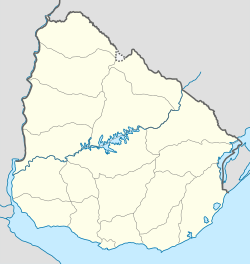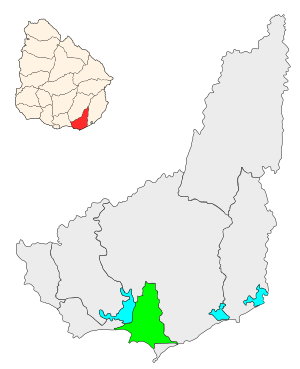Maldonado, Uruguay facts for kids
Quick facts for kids
Maldonado
|
||
|---|---|---|
|
Capital city
|
||
|
From top, left to right: view of the Cathedral, the Artigas Monument in San Fernando Square, Downtown Maldonado, the Police Headquarters, the Vigía Tower and the Nicolás García Uriburu Museum
|
||
|
||
| Country | ||
| Department | ||
| Founded | 1755 | |
| Founded by | Joaquín de Viana | |
| Population
(2023 Census)
|
||
| • Capital city | 90,035 | |
| • Urban | 135,014 | |
| • Metro | 157,500 | |
| • Demonym | Fernandino | |
| Time zone | UTC -3 | |
| Postal code |
20000
|
|
| Dial plan | +598 42 (+6 digits) | |
| Climate | Cfb | |
Maldonado is an important city in eastern Uruguay. It is the capital of the Maldonado Department. In 2023, about 90,000 people lived there, making it the fourth largest city in Uruguay.
When you include nearby cities like Punta del Este and San Carlos, the total population of this area is over 135,000 people. This makes it a big urban area.
Contents
History of Maldonado
How Maldonado Got Its Name
The name Maldonado comes from a man named Francisco Maldonado. In January 1530, an explorer named Sebastian Cabot left his lieutenant, Francisco Maldonado, in the bay area. This bay later became known as Maldonado.
Founding the City
Later, in the 1700s, Spain and Portugal were dividing up land in South America. The military governor of Montevideo, José Joaquín de Viana, suggested creating new towns. One of these was Maldonado.
In August 1755, Viana decided to start the town even before the King replied. He brought families to the area, giving them animals and supplies. The small settlement grew by farming and raising livestock. When Viana returned almost two years later, he brought more families to help the village grow even more. He also moved the town to its current location.
Becoming a City
Many buildings in Maldonado, like the cathedral, look like traditional Spanish buildings. This shows that the Spanish royalty helped the city develop.
By May 1783, the town had grown a lot. The people chose Don Luis Estremera to help create a city council. This officially made Maldonado a city.
On March 14, 1787, the first City Council of Maldonado was elected. The town was renamed San Fernando De Maldonado. This name honored Ferdinand VI of Spain, the King of Spain at that time. With a city council, the people of Maldonado could better protect their rights.
Geography and Climate
Where Maldonado Is Located
Maldonado is located on Route 39. It is next to Punta del Este to the south and Pinares – Las Delicias to the south and east. The suburb of La Sonrisa is to the north. All these areas together form one large metropolitan area. The city of San Carlos is only about 13 kilometers (8 miles) north on Route 39.
The stream called Arroyo Maldonado flows east of the city.
Maldonado's Climate
Maldonado has an oceanic climate. This means it has mild winters with no snow. The summers are warm, sometimes even hot. This type of climate is similar to what you might find in southeastern Australia.
The city's location near the Malvinas/Falkland current and a narrow part of the continent helps create this unique ocean-like climate on the east coast.
Population Growth
In 2011, the city of Maldonado had a population of 62,590 people. The local government (Intendencia Departamental de Maldonado) says that the wider area of Maldonado municipality has about 105,000 residents.
Here's how Maldonado's population has grown over the years:
| Year | Population |
|---|---|
| 1908 | 4,431 |
| 1963 | 15,005 |
| 1975 | 22,762 |
| 1985 | 33,535 |
| 1996 | 48,936 |
| 2004 | 54,603 |
| 2011 | 62,590 |
Source: Instituto Nacional de Estadística de Uruguay (National Institute of Statistics of Uruguay)
Main Sights to See
Maldonado has several interesting places to visit:
- San Fernando de Maldonado Cathedral: This beautiful church was started in 1801 and finished in 1895. It has a neoclassic style.
- Cuartel de Dragones (The Dragoons' Barracks): This was a Spanish military base. It was started in 1771 and completed in 1797.
- Torre del Vigia (Watchtower): Built in 1800, this tower was used to watch for ships entering the Río de la Plata or heading towards Buenos Aires. It would inform authorities about any approaching vessels.
- El Puente de la Barra: This is a unique bridge where the road goes up and down like waves. It's known for its interesting design.
- Casapueblo hotel: A famous hotel known for its unusual, sculpted architecture.
Places of Worship
- Cathedral of St. Ferdinand (Roman Catholic)
- Church of Our Lady of the Remedies (Roman Catholic)
- Church of Our Lady of the Thirty-Three (Roman Catholic)
Notable Residents
Some famous people from Maldonado include:
- Alberto Abdala (1920–1986), who was the Vice President of Uruguay from 1967 to 1972.
- Johnny Aquino (1978- ), a professional association football midfielder.
- Maite Cáceres (2003- ), a racing car driver.
- Martín Campaña (1989- ), a professional goalkeeper for a football team.
- Fernando Clavijo (1956-2019), a retired soccer player.
See also
 In Spanish: Maldonado para niños
In Spanish: Maldonado para niños
 | Selma Burke |
 | Pauline Powell Burns |
 | Frederick J. Brown |
 | Robert Blackburn |










